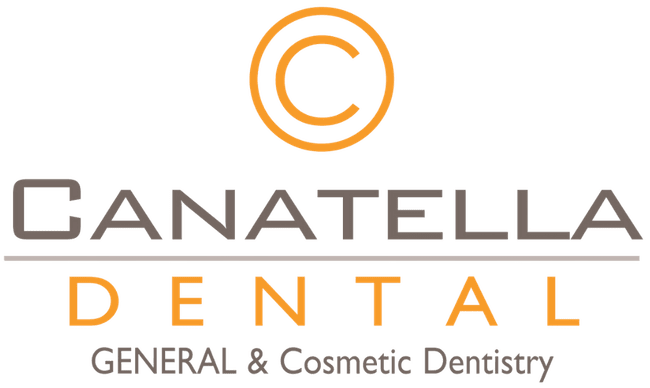Missing teeth can make everyday activities like eating and speaking a challenge. Fortunately, our modern dentistry offers great solutions to bring back your smile. Dentures and partial dentures are some of the most popular restorative dentistry services. We will give you a natural-looking and functional replacement for missing teeth.
At Canatella Dental, we provide custom dentures designed to fit comfortably and help you enjoy life without worry. Whether you need to replace a few teeth or an entire set, Dr. Todd Canatella can create a personalized solution that works for you.
What Are Dentures?
Dentures are removable dental appliances that replace missing teeth. They consist of artificial teeth attached to a gum-colored base. The result will give you back the ability to chew properly and smile with confidence. If you’ve lost teeth because of decay, injury, or gum disease, dentures can be a great way to restore function and appearance.
Dentures have come a long way from the early versions made of wood, ivory, or even real human teeth! Today, they’re crafted from durable materials like acrylic resin and porcelain. These materials look more natural and feel more comfortable.
If you’re looking for an even more secure fit, implant-supported dentures might be the right option. These dentures attach to dental implants and create a stable solution that functions just like natural teeth. Dr. Canatella will help you find the best type of denture based on your needs and goals.
Types of Dentures
Dentures aren’t a one-size-fits-all solution. Here are the main types available:
- Complete Dentures: These replace all the teeth in either the upper or lower jaw. They are often when no natural teeth remain. Complete dentures can be further classified into immediate and conventional types. Immediate dentures are placed immediately after the dentist removes teeth, while conventional dentures are made after the gums have healed.
- Partial Dentures: These fill in gaps left by missing teeth. They attach to your natural teeth using metal clasps or precision attachments. Partial dentures are ideal for patients who still have some healthy teeth remaining. They help in distributing the chewing forces evenly across the mouth and prevent the remaining natural teeth from shifting.
- Implant-supported dentures use dental implants to secure the denture in place. They offer more stability than traditional dentures. Implant-supported dentures can be either removable or fixed, depending on the patient’s preference and oral health condition. They provide a more secure fit and can significantly improve the quality of life for denture wearers.
Should I get a Partial Denture or Dental Bridge?
Partial dentures and dental bridges work in a similar way. They both fill in gaps when you’ve lost multiple teeth but still have some natural ones left. They keep your remaining teeth in place so they don’t shift out of alignment, which keeps your bite and smile looking natural.
A partial denture consists of replacement teeth attached to a base that matches the color of your gums. Some also include a metal framework for extra support. They’re designed to blend in with your natural teeth, so they look and feel as close to the real thing as possible. Plus, they’re custom-made to fit comfortably, making it easier to eat, speak, and smile with confidence.
Getting partial dentures takes a few steps. The steps include taking impressions of your mouth, creating a model, and making any needed adjustments to ensure a perfect fit. For an even more secure option, partial dentures and dental bridges can be anchored with dental implants. This helps them feel more stable and offers many of the same benefits as replacing a single tooth with an implant.
Benefits of Partial Dentures
Partial dentures offer several advantages:
- Improved Chewing: They enable you to chew food more effectively. Partial dentures help distribute the chewing forces evenly, reducing the strain on your remaining teeth.
- Enhanced Speech: They help you speak more clearly by filling in gaps. Missing teeth can cause speech problems, such as slurring or difficulty pronouncing certain words. Partial dentures can help restore your ability to speak clearly and confidently.
- Prevent Teeth Shifting: They keep your remaining teeth from moving out of position. When you lose a tooth, the adjacent teeth may shift into the empty space, causing misalignment and bite problems. Partial dentures help maintain the proper alignment of your teeth and prevent these issues.
- Aesthetic Appeal: They restore your smile and boost your confidence. Partial dentures match the color and shape of your natural teeth, so you’ll forget you have them. This can significantly improve your self-esteem and overall happiness.
Implant Supported Dentures
Implant-supported dentures are a more permanent solution. Titanium implants are surgically placed into your jawbone. These implants act as anchors, providing a stable base for the dentures. Implant-supported dentures can replace a single tooth, multiple teeth, or an entire arch of teeth.
The process of getting implant-supported dentures involves several stages. First, you get a thorough exam from your dentist. Then, placement of the implants, and a healing period to allow the implants to integrate with the jawbone. Once the implants have fully integrated, the dentist attaches the dentures to the implants.
Advantages of Implant Supported Dentures
Implant-supported dentures are worth considering as a more permanent and stable option. They offer benefits like:
- No Slipping: They remain securely in place, reducing the risk of slipping. Traditional dentures can sometimes shift or move, causing discomfort and embarrassment. Implant-supported dentures provide a more secure fit so you can easily eat, speak, and smile.
- Better Comfort: Implant-supported dentures feel more natural and comfortable. They distribute the chewing forces more evenly across the jawbone. This reduces the pressure on the gums and provides a more comfortable experience.
- Better Bone Health: Implants stimulate the jawbone, preventing bone loss. When you lose a tooth, the jawbone in the empty space may deteriorate from lack of stimulation. Dental implants also help prevent bone loss and preserves your facial structure.
- Long-lasting Results: Implant-supported dentures offer a durable and long-lasting option. With proper care and maintenance, they can last for many years.
Choosing the Right Denture
Picking the best type of denture depends on a few key factors, including how many teeth you’re replacing and your lifestyle. Some people prefer traditional removable dentures, while others opt for implant-supported versions that stay firmly in place. Dr. Canatella will assess your oral health, discuss your preferences, and help you decide which option makes the most sense for you.
Other things to consider include the strength of your jawbone, the condition of your gums, and how comfortable you want your dentures to feel throughout the day.
Caring for Dentures
Taking good care of your dentures helps them last longer and keeps your mouth healthy. To keep your new smile in great shape, stick to a good cleaning routine and visit your dentist regularly.
Make sure to clean your dentures every day with a soft-bristle brush and a cleaner made specifically for dentures. Regular toothpaste can be too harsh and might wear down the material, so it’s best to avoid it. After brushing, rinse them well with water to get rid of any leftover cleaner. At night, soak your dentures in a denture solution to keep them from drying out or losing their shape.
Don’t forget to visit Canatella Dental for regular check-ups and adjustments. Dr. Canatella will make sure your dentures fit comfortably and work as they should. These visits also give your dentist a chance to check on your overall oral health and catch any potential issues early.

